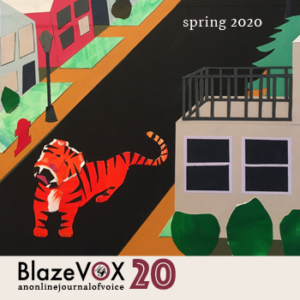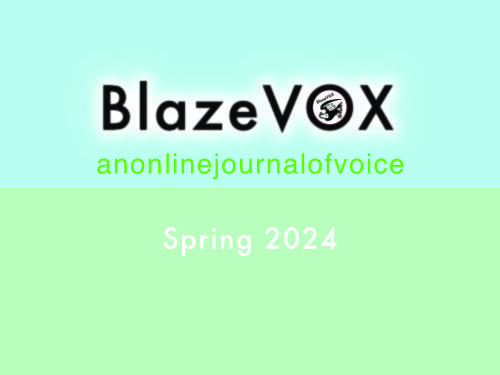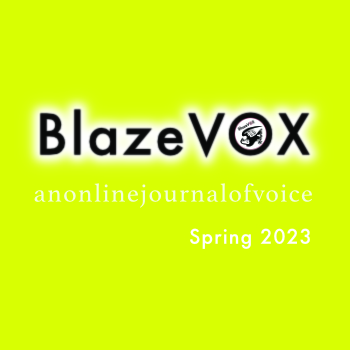IntroductionIntroduction
 Hello, and welcome to the Spring issue of BlazeVOX 20. Presenting excellent works of poetry, fiction, text art, visual poetry, and arresting works of creative non-fiction written by authors from around the world. Do have a look through the links below or browse through the whole issue in our Scribd embedded PDF, which you can download for free and take it with you anywhere on any device. Hurray!
Hello, and welcome to the Spring issue of BlazeVOX 20. Presenting excellent works of poetry, fiction, text art, visual poetry, and arresting works of creative non-fiction written by authors from around the world. Do have a look through the links below or browse through the whole issue in our Scribd embedded PDF, which you can download for free and take it with you anywhere on any device. Hurray!
In this issue, we seek to avoid answers but rather to ask questions. With a subtle minimalistic approach, this issue of BlazeVOX focuses on the idea of ‘public space’ and more specifically on spaces where anyone can do anything at any given moment: the non-private space, the non-privately owned space, space that is economically uninteresting. The works collected feature coincidental, accidental, and unexpected connections, which make it possible to revise literary history and, even better, to complement it.
Combining unrelated aspects lead to surprising analogies these pieces appear as dreamlike images in which fiction and reality meet, well-known tropes merge, meanings shift, past and present fuse. Time and memory always play a key role. In a search for new methods to ‘read the city,’ the texts reference post-colonial theory as well as the avant-garde or the post-modern and the left-wing democratic movement as a form of resistance against the logic of the capitalist market system.
Many of the works are about contact with architecture and essential living elements. Energy (heat, light, water), space, and landscape are examined in less obvious ways and sometimes developed in absurd ways. By creating situations and breaking the passivity of the spectator, to develop forms that do not follow logical criteria but are based only on subjective associations and formal parallels, which incite the viewer to make new personal associations. These pieces demonstrate how life extends beyond its own individual limits and often tells a story about the effects of global cultural interaction over the latter half of the twentieth century. It challenges the binaries we continually reconstruct between Self and Other, between our own ‘cannibal’ and ‘civilized’ selves. Enjoy!
Rockets! Geoffrey Gatza, editor
Evan Hurlburt — AMERICAN SHADE
H.K. Brady — serve me to death
Autumn Outlaw — A Silicon Situation
Dan A. Cardoza — A Sense of Place, a Sense of Loss
E. Shaskan Bumas — Darllings
Haley Moore — But Of The Living
John Tavares — Black Swan
Kevin Ryan — The Three lions
Marty Kleinman — Getting Hit
Robert Wexelblatt — Petite Suite Internationale
S.W. Campbell — Ten Hut
Shea Mitchell — Toothless Dreamer, or Logan, King of the Playground
Sue Davidson — Night Art
Andrew Brenza — 5 Visual Poems from the series, e(ye)scapes
hiromi suzuki — Through the Telescope
Mark Young — 5 Visual Poems
Pamela Miller — 4 Visual Poems
BlazeVOX20 Spring 2020 by BlazeVOX [books]
New & Forthcoming from BlazeVOX books
The Exploding Nothingness of Never Define by Anne Tardos
Anne Tardos, whose poetry & performances have delighted us for several decades now, emerges in her new book as the innovator of a work that incorporates, like the best of our poetry, a full range of thoughts & experiences & makes them stick in mind & memory. The Exploding Nothingness of Never Define is her complex, often surprising meditation on poetry and life that starts with a series of takes on the idea and image of “the poet” and goes on to make something new, which she arranges in a series of nine serial poems, delivered with a true poet’s intelligence, “the pride of lived experience,” she says and wanders, wide awake and dreaming, searching for new/old places/faces to observe and call to life. —Jerome Rothenberg
Moments wander through exits in Diana Adams’s Imported Poems, filled with characters from novels, theater people, librarians, mirrors, quicksand. It’s an intriguing, mysterious wandering Adams leads us through, equal parts danger and humor, as we’re embroiled in these things happening, as “the dead are watching / through the walls”. It’s both true and unresolvable, this interplay of questions and actions that sway through these poems where nothing is stationary. It’s an important reminder to watch out for, delightfully and meditatively rendered, a back and forth journey not quickly forgotten. —John Gallaher
Maps for Jackie by Jason Labbe
Poetry’s natural habitat is one of detail, radiant or tarnished, an intimate geography that draws us close to where presence is an act of perception: world into word. In Maps for Jackie, Jason Labbe navigates a terrain of singular encounters and incidents, tactile, luminous and animated by the sensuous abrasions and comforts of the heartmind as they touch down on his, and our, present: white leaf is like a moth / wing I’d fix to her shoulder. —ANN LAUTERBACH
A Thousand Words and Others by George Tysh
George Tysh’s two-part take on presence and absence is rooted in jazz and painting, French and Mandarin, memory and longing, in a recto-verso approach to structure. Its first bareboned section, “A Thousand Words,” is 100 pages, ten words per page, set in columns that give a nod to classical stanza form. Part Two, “and Others,” a coda of sparse lyrics, fills out the tone of what is barely implied in Part One. In a mixture of vernacular and stark poetics, he produces a book-length series that experimental novelist Lynn Crawford calls, “Lush. Rhythmic. Disturbing. Gorgeous.”
Under the Impression by James Berger
Under the Impression transverses the spongy dents in the surfaces of language and memory. Anti-lyrical and insistently lyrical, frank, interrogative, and punctuated with humor, Berger’s poems articulate brilliantly an inventive scepticism of the real world’s edges and fictions. Lines like “The cat is chasing the bouncing ball. / Can you determine if that is a true statement?” and “What’s so pressing?…We will see the shape when we no longer see the violence” imbue Berger’s reader with a monstrous sensitivity toward the perceptible persistence of absence, time, injustice, and the possibility of happiness. —Orchid Tierney
When Basinski hit spell check for Basinski it said, “no reference information.” He wondered if he could just get away with that? But no, he was defeated. SO, he tried and it was endless in his head labyrinth and he tried and tried: When asked about SALVAGE Basinski pondered and battled with his selves. He didn’t know. He was afraid. His impulses were everywhere. The veil of art, which would unveil nothing! The silly, try too hard, musings of an aging being! Alien communication, confrontation, and arrogance and some rampant need and want. He was very confused. Well, that was his life so what would he expect. He heard, “I find the form in that line of REfuse on the beach sometimes REferred to as a beach necklace, which is to say seaweed and stones, would and plastic, and bits buttons and bows of what not and bric-a-brac.” But what he wanted to write was, “A ghost hit save: “Jo Jo was a man who thought he was a loner…” He spent the day recovering. His ghost though “you won’t find it so hot / if you ain’t got that do re mi.” Re? REscue, REclaim, REstore (the REcord store) REinstate. Instead he combed the beach for various objects that caught his ears and eyes and he gatheREd them up and he said, I can raise the dead.”
Sauvage: Essays on Anglophone Poetry by Richard Owens
Broad in scale and scope, this volume attends to developments on the terrain of contemporary Anglophone poetry deeply articulated with issues of balance, justice, measure, and distance as these variously cohere, come apart and recombine across the unfolding present. Decentered and transatlantic in orientation, the essays aggregated in this volume emerge from a variety of social contexts, including the popular and the scholarly, print and digital forums, the cosmopolitan and the local, the center and the margin.
From Delaware Memoranda (2008) through Dead in the House of Pound (2018), this volume brings together a broad constellation of poetic work, much of which first appeared through presses on both sides of the Atlantic in editions either out-of-print or distantly circulated. In drawing this work together, the contiguous interests—formal and otherwise—that have compelled this labor are rendered sharper, more legible, and more readily apparent despite the passage of this work from earlier appearances in other social and intellectual contexts.
Boombox Serenade by Joey Nicoletti
Boombox Serenade is a playlist for middle age, Gen X edginess softening into domestic routines. But rather than lament that domesticity, the poems celebrate it, praising the comforts of marriage, family, pop culture, and food. Amid shouts-out to R.E.M. and The Cure, baseball and comic books, Nicoletti’s poems sharply observe and rejoice at small moments, from “auditioning” a raft of pies for Thanksgiving dinner, to bittersweet recollections of family members who’ve passed on. In the title poem, the speaker lists the songs to be played at his funeral and the friends to whom they’re dedicated; the resulting poem, and the collection as a whole, is a catalog of love and human connection, a “playlist of gratitude.” —Juliana Gray, author of Honeymoon Palsy and Roleplay
Going Head To Head by Wade Stevenson
Freewheeling and rooted, prophetic and playful, madcap and sincere in the rich tradition of Vicente Huidobro’s Altazor, Wade Stevenson’s Going Head to Head is a rare, refreshing collection. It’s widely allusive and wildly (in)formal, moving in and out of rhyme schemes freely, filling the ancient long-poem form with SpaceX rockets and AI nightmares, all while dancing between the sacred and the profane with such gusto that soon it’s delightfully hard to tell the difference. Going along for this ride is a true pleasure.
— J.G. McClure, author of The Fire Lit & Nearing



Comments (0)